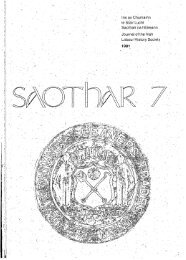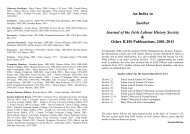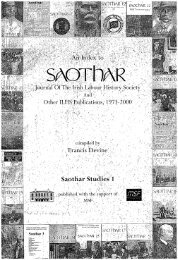Create successful ePaper yourself
Turn your PDF publications into a flip-book with our unique Google optimized e-Paper software.
; ~ ; ,The Decline and Fall of Donnybrook Fair:Moral Reform and Social Control in NineteenthCentury DublinFergus A. D' Arcy'This annual scen~ of fun and frolic commenced on Sunday,that b;;'ing what is termed 'the walking day'... the greatest harmony and good humour prevailed throughout the day and numerous groups were to beseen recreating and amusing themselves in an innocent manner. qSo wrote the correspondent of the Freeman's Journal newspaper in August 1819, describing theannual fair at Donnybrook. Four years later Charles O'Flaherty' s description was no less enthusiastic:'the amusements at Donnnybrook this season are on a grand and most extensive scale', and includedtight-rope ladies, slack-wire gentlemen, a family of monkeys, a rocket display at night, and a big fightbetween men from Bray and men from Mullingar over a woman. 2 His enthusiasm was shared by thereporter for Saunders' Newsletter who recorded an exceedingly numerous attendance and noted that'many females of the highest respectability drove through the Fair during the day, and the scene, inconsequence of the beauty of the weather, was particularly animated.'3For a very long time indeed, centuries in fact, Donnybrook had been one of Ireland's principalmarkets and fairs, and by that very token, a major scene of excitement and merriment for the mass ofthe people.- Founded by charter of King John in 1204, he gave licence to the citizens of Dublin to holdthis annual fair, its various tolls and taxes being vested in the Corporation of Dublin.4The great commercial importance of the fair declined from the seventeenth century. In the 1690sthe Corporation, in order to raise some quick money to clear a debt, conveyed the right to the revenuesof the fair to the local gentry family of Ussher. Finally, in 1812, the right to these revenues waspurchased outright by John Madden of Donnybrook for £750. How much the right to the revenues wasworth iri the eighteenth century is not clear, but in the nineteenth century they fell from around £400per annual fair in the 1830s to £120 in the 1850s. The income, for what it was worth, was derived froma series oflevies on various sales and stands. 5 While there is little doubt that the commercial importimceof Donnybrook Fair declined significantly over the eighteenth and nineteenth centuries, it still remaineda not unimportant market for horse trading and for all of its life span in the ninetee'nth century Dublincity's hackney cab drivers used the fair for procuring the animals essential to their trade. Furthermore,even as its overall economic significance in the life of Dublin and Ireland declined, its recreationalsignificance-almost certainly grew as the city itself grew and larger numbers~of the common peoplesought an annual outlet for their cares. '.There is no disputing its place as a major source of popular entertainment and rough merriment. Itwas in the eighteenth century that it became a byword in this respect. Jonah Barrington in his memoirsprovided a vivid arid memorable account of the fair at its liveliest towards the end of that century.6 Hisdescription serves to confirm many earlier references to a festival that had been often turbulent andsometimes violent. 7 But by the end of that century and the beginning of the next Donnybrook Fair hadbecome much less physically boisterous while still retaining its humour and high spirits.It was still a good place for runaway couples to find a priest to marry them. By one account a Germanclergyman named Schultz, and nicknamed 'Tack' em' used to marry them there,S and a Fr. Keamey ofLiffey Street claimed that more marriages were contracted in the week'~ter Donnybrook than in anytwo months of the rest of the year. 9 In the 1820s it was still a place where high and low, rich and poortame together to enjoy a good boxing match, wrestli~g contest, or to take part in the dancing ono listen7





